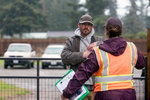

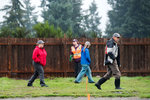
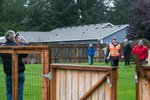
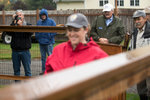
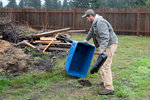
Chris Weaver feels targeted by the government in a war over pocket gophers.
Weaver, who wants to build a small garage on his home property in Rochester, says he turned in his plans for the project one year ago but so far the only markings of progress on his property are four wooden stakes that mark the proposed corners of the garage.
That’s because Weaver has been forced to postpone his project until he gets government approval to go forward.
The gum in the gears that’s holding up the process? Just like other projects in south Thurston County, it’s the unconfirmed presence of the endangered Mazama pocket gopher.
On four separate occasions over the past year, Weaver has had government agents scour his modest property on a relentless search for signs of the pocket gophers.
The official process calls for three inspections, spaced apart by one month each, but some fine print forced Weaver to comply with the fourth visit.
“They decided that they wanted to take a look at the balance of the property rather than just the footprint of the garage that Chris wants to build,” explained Larry Weaver, Chris’ father. “They apparently have the right to go 300 feet beyond where there would be any actual soil disturbance from the project.”
Larry Weaver noted that the first two inspections produced a clean bill of health for his son’s property, and the government representatives seemed satisfied with an examination of the ground beneath, and immediately surrounding, the proposed garage site. After the third visit, though, word was passed down to the Weavers from the Thurston County Resource Stewardship that they would be required to submit to a fourth, expanded inspection.
Thurston County also claimed that Chris Weaver erred prior to the third inspection by mowing his lawn too close to the inspection date.
The county said that by mowing his lawn, Weaver had effectively “scalped” any gopher or mole mounds on his property, preventing the inspectors from determining the origin of the mounds.
This is not Chris Weaver’s first pocket gopher rodeo, though. He says he has been dealing with property issues related to the presumed presence of pocket gophers since 2007. Then, in 2010, Weaver was arrested and charged with, to his recollection, 12 misdemeanors after he trapped a pocket gopher, which at that time was listed as threatened as opposed to its current endangered listing.
In order to extract himself from that hot water, Weaver hired a lawyer at a cost of $5,000 and was eventually able to plead his case down to six or seven misdemeanors (he forgets exactly how many). Ultimately, he was forced to pay a $180 fine and carries that handful of misdemeanors with him.
On Thursday, a gallery of onlookers assembled by the Weavers watched on as four government representatives conducted the fourth, and possibly final, inspection of Chris Weaver’s property. The inspection team consisted of one member of the Thurston County Resource Stewardship and three members of the U.S. Fish and Wildlife. The observing parties included numerous members of the Weaver family as well as John Hutchings and Gary Edwards, both of whom are running as independent candidates for Thurston County Commission seats. Larry Weaver invited the aspiring politicians along so they could witness the process first-hand and better understand the burden placed on property owners by the restrictive pocket gopher protection protocol.
The Inspection
On Thursday, the four-person inspection crew walked a gridwork pattern across the parameters of Weaver’s property in search of above ground signs of pocket gopher presence. One member of the inspection team noted that above-ground visual inspection is the best method for pocket gopher detection this side of using a live trap. That method, as Chris Weaver can attest, is highly frowned upon.
One spot that drew the inspectors in right away was a small mound of dirt about 10 feet from the proposed garage location. Weaver had taken efforts to keep the dirt mound covered overnight in order to protect it from rain and was confident that it was of innocuous mole origin rather than troublesome pocket gopher genesis. After a cursory inspection of the tailings, the inspectors confirmed Weaver’s suspicion that it was mole-made and moved on to the rest of the property.
After roughly 20 minutes of shuffling around the property in the rain, the inspectors loaded up to leave and revealed that they had not found any evidence of pocket gophers anywhere on the property.
“Now we will send a letter to the county saying that this land is clear,” explained Lindsy Wright of the USFW. “Then they will issue the permit.”
Wright explained that if Weaver does indeed receive his permit and the right to go ahead with his project, he will have only until the start of next year’s “gopher season” on May 1 to complete construction. That means that if the project is not completed within the next six months, Weaver could be forced to resubmit for another permit. Repeating the process would take, at a bare minimum, three months to complete.
Once the pocket gopher inspection concluded, Chris Weaver expressed a modicum of doubt that the inspectors’ positive assertions represented the entirety of the story.
“They are not the final authority,” said Weaver.
Weaver lamented that the process is overly cumbersome, creating massive amounts of lost time, money and effort on the part of homeowners. Weaver also noted, “The fear of God of having to negotiate with the federal government ... It’s kind of intimidating having four government officials come out and walk your property.”
All that’s left for Weaver to do now is sit and wait until he receives official written permission from Thurston County. As the waiting game began on Thursday, Weaver expressed confidence that he would ultimately be granted permission to build his garage.
Pausing for a moment, Weaver added, “But I was confident last time too.”